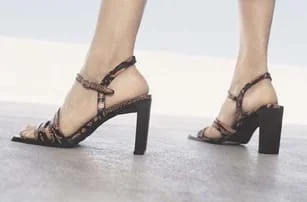
Looking your best might not always be the best thing for you. Today's society is extremely fashion and style conscious. Unfortunately, clothing designers and stylists
aim to please by creating unique looks that might not always be practical or even comfortable.
The look of the season shows runway models in high platform heels and tight skirts or pants. Models have perfected the runway "walk," but the popular looks and accessories are frequently impractical and could create leg, back, and spine or neck problems. "Sometimes I see a woman walking down the street with high heels and a two-ton bag, and I want to stop her and make her aware of what she is doing to her body," says Dr. Jerome McAndrews.
Women generally wear high heels to complement an outfit, not for comfort, but some might not realize that these shoes can cause serious discomfort in the feet and can also exacerbate back pain. High heels alter the balanced position of a person's body. When a woman wears high heels, a new dynamic equilibrium occurs.
Dr. McAndrews compared the musculoskeletal system to a mobile, hanging in dynamic equilibrium, each part balancing the other. If one part becomes 'fixed,' the whole system will compensate with a movement or restriction. Essentially, wearing high heels for any length of time increases the normal forward curve of the back and causes the pelvis to tip forward. This alters the normal configuration of the pelvis and spine necessary for the body to maintain a center of gravity.
"The legs are the foundation of the musculoskeletal system, and a person standing flat-footed or barefooted would be completely balanced," said Dr. McAndrews. "While standing, the hamstrings are taut and both parts of the pelvis are stabilized so that the support is normal. By bringing the heel up, you encourage the shortness of the hamstring muscles."
Women and men alike fall into the fashion trap. However, women, more than men, tend to wear
clothes that are too tight. Stylish tight tube skirts and tight pants can be attractive, but are often too restrictive. Clothing that is too tight can throw a person offbalance, and can make simple everyday tasks such as bending, sitting and walking become difficult . "Tight clothes restrict a person from moving comfortably, resulting in poor posture and misalignment of the spine," said Dr. McAndrews.
Another unhealthy fashion statement is the use of heavy purses, backpacks and handbags. Women and men tend to carry too many items in one bag, or briefcase, and are often not aware of the potential health risks associated with toting an excessive amount of "stuff." Carrying a bag with detectable weight-more than 10 percent of your body weight-can cause improper balance. When hiked over one shoulder, it interferes with the natural movement of the upper and lower body. "The person carrying the bag will hike one shoulder to subconsciously guard against the weight, holding the other shoulder immobile," said Dr. McAndrews. "This results in the unnatural counterbalance movement of one shoulder and little control over the movements of the arms and legs. Even worse, the spine curves toward the shoulder."
More and more people carry their credit cards, ATM cards and personal identification in the back pocket of their pants. This might be a convenient way of carrying the necessary items with you each day, but carrying your wallet in the back pocket of your pants can cause discomfort. Dr. McAndrews suggested men and women remove their wallets or other items before sitting for long periods of time. "Sitting on your wallet or card holder for the entire day will create a pocket in the muscle lying underneath the wallet, and whether your pants are tight or loose-fitting, this can result in discomfort or pain."
In today's society, it might be important to you to look fashionable, but it is more important to choose clothes, shoes and bags that are comfortable and that suit your style. By following and remembering these simple steps, it is possible to look and feel your best.
• Choose comfortable shoes. If you must wear high heels, bring a pair of flat shoes along with you to change into should you become uncomfortable. If you walk to work, wear flat shoes and change into your more fashionable shoes when you arrive to alleviate any pain or discomfort.
• If the shoe is uncomfortable while standing, chances are it will not be any more comfortable while walking. The wrong shoe can affect the body's center of gravity.
• Choose supportive shoes. Designer spikes or non-supportive loafers may look nice but do not allow for easy, symmetrical walking.
• While sitting, whether or not you are wearing heels, it is important to take frequent stretch breaks to alleviate atrophy of the hamstring muscles.
• Avoid excessive wear of tight pants or clothing. If you prefer tighter clothes, choose styles that
allow you to perform daily tasks with ease.
• Select a briefcase or purse with a wide adjustable strap. Ideally, the strap should be long enough to place over the head. This evenly distributes the bulk of the weight across the body.
• When carrying a bag, or briefcase, switch sides frequently to avoid placing the burden of the
weight on one side of your body.
• Take the time to empty unnecessary items from your bag.
• Place all necessary items-such as wallets and cellular phones-in the front pockets of the
bag. Stretching around to reach for your wallet can result in a pulled neck or back.
• If you are driving or sitting for long periods of time, remove your wallet or card holder from
the back pocket of your pants.
Designers and stylists tend to be more concerned about the way something looks rather than the way it feels. Listen to your body. One of the most important aspects of being in style and looking your best is to maintain healthy judgment. By following simple suggestions, being fashionable can be comfortable.
